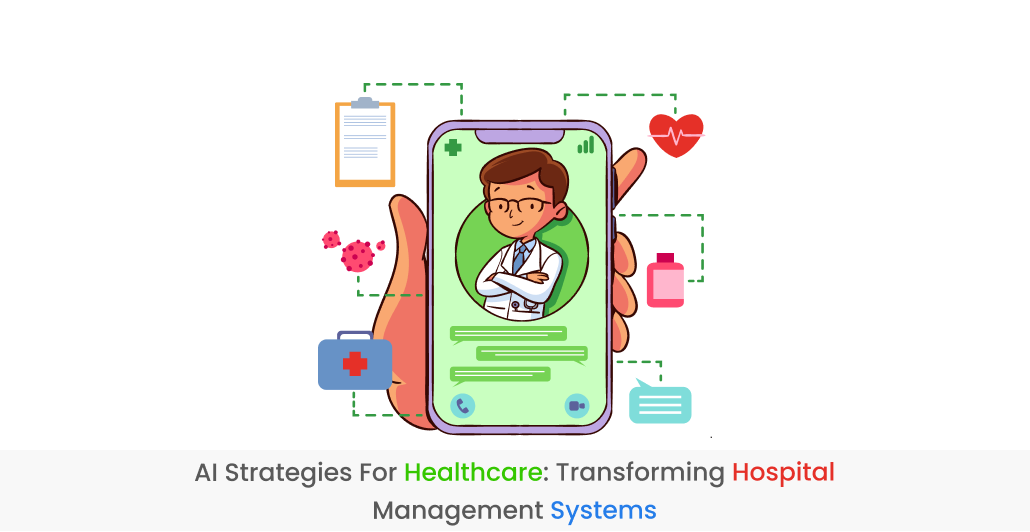AI Strategies for Healthcare: Transforming Hospital Management Systems
In more recent times, the use of artificial intelligence (AI) in healthcare has gained high regard as this is seen as a way of making essential changes in things closely related to healthcare. On the other hand, among these applications, AI in the hospital management system (HMS) has established itself as a paramount field with dazzling prospects for drastically changing health management.
As hospitals become increasingly complex in their day-to-day operations while providing up-to-the-mark healthcare, AI is gaining momentum as one of the most effective tools for simplifying procedures in clinic management systems, tending toward mindful resource utilization, and overall process enhancement.
The paper is dedicated to discussing AI utilization in the Hospital Information Management System (HIMS), focusing on how AI makes transformational change possible and has a firm grip on the future of healthcare administration.
Applications Of AI in HMS
Applications of AI in Diagnosis and Treatment Planning in Hospital Management Systems (HMS):
This paper will specifically address the advantages of AI in the hospital management system process, scrutinizing the various implemented cases, complex issues, and advantages. AI can enhance the efficiency of patient flow resource utilization and revenue cycle management, with the goal of enabling the healthcare establishment to deliver good value across the board.
Medical Imaging Analysis:
AI is not just a tool that helps doctors see or make algorithms; rather, it gives them an extra set of scanning eyes. AI empowers doctors by deploying advanced technology to learn and identify issues like tumours and fractures in X-rays, MRI, and CT Scans, which is more accurate and faster than when doctors analyze themselves.
This will allow physicians to arrive at their diagnoses faster, thus planning a better course of treatment for patients.
Clinical Decision Support Systems (CDSS):
Please remember that CDSS with AI technology means directing your doctor as a trustworthy advisor. By combining vast amounts of data such as medical history and laboratory results, AI can give precision advice to doctors to confirm diagnosis and suggest treatment.
It is as if you have one brainy buddy at work that you can always count on to share wisdom and give you vital advice whenever you decide to care for patients.
Predictive Analytics:
It is AI for not forecasting the future but for creating the doctors’ ability to be proactive towards the decision-making process. By analysing many patients’ data, AI in hospital queue management systems forecasts patients’ outcomes and disease progression and can also predict some treatment responses.
Such practice allows doctors to craft tailored treatment plans for every patient based on their unique condition, boosting both outcome and quality of care.
Genomic Analysis:
Through AI, we are decoding DNA secrets to further understand diverse genetic disorders and potential treatments. Aids helps doctors by identifying genetic alterations and signatures related to rare diseases.
In this manner, disease prevention is well achieved, and a new approach to personalized treatment options appears based on each patient’s genetic makeup.
Natural Language Processing (NLP):
AI does not work specifically with numbers and data snippets; it involves much studying through the human language. NLP in AI can automatically read and figure out what is written in the notes of a patient, records of medicine, and research articles.
Just one sentence in the clinical records, medical records, or research articles can give NLP AI in hospital management systems in India valuable information that doctors may not notice without these tools. It’s like having a language expert who can use data mining to digest or decode tons of information to provide doctors with highly relevant information.
AI Strategies for Healthcare
- Define Clear Objectives: First, specify clear goals that AI will help achieve. Seek out the exact areas where AI solutions can be used to obtain results, like high-accuracy disease diagnosis, coordination of patient care, or optimization of clinic operations.
- Data Governance and Management: Establish resilient data governance and management systems that will ensure that such data is of high quality, well-secured, and easily accessible by the Hospital Management Systems In Healthcare entities. It’s like the more data the AI is fed, the better the AI. So, organizations should pay more attention to the issues of data anonymity and compliance with privacy regimes.
- Collaboration and Partnerships: Dispense with cooperation and partnership with technology vendors, research centres, and healthcare providers to rely on one another’s proficiency and resources in AI development and implementation. Collaborative efforts can quicken advances and broadly affect the sharing of knowledge across the healthcare system.
- Invest in Talent and Training: AI in hospital management system modules at the enterprise by hiring new professionals, training, and upgrading the skill set of the existing workforce. Healthcare systems require the talents of educated people with data scientists, AI engineers, and clinical experts necessary for successful AI initiatives implementation and maintenance.
- Ethical and Responsible AI: Firstly, give ethical and responsible AI preeminence over decisions based on AI that favour transparency, fairness, and accountability. Create guidelines and frameworks for ethical AI applications, i.e., unveil the biases, protect privacy, and clarify the algorithm results.
- Continuous Evaluation and Improvement: Install apparatuses for repeat or periodic evaluation and improvement of AI systems. Track the performance metrics, user feedback, and clinical outcomes wherein the areas needing ongoing improvement can be identified, and areas for optimization and refinement can be made over time.
Conclusion
Ultimately, combining AI into hospital management systems online emphasizes the great chance to redevelop them in a more human-friendly mode. With the designed manner of AIs, hospitals can significantly improve the quality of patient care by effectively using resources and automating tasks, thereby enhancing efficiency and productivity.
Through the influential objectives of setting clear goals, maintaining data integrity, and collaborating, healthcare teams can achieve their goal of assisting AI in improving diagnosis, treatment planning, and resource allocation.
In the end, we can develop healthcare systems that are more patient-centred and care-oriented, with better outcomes as the primary consideration.

















